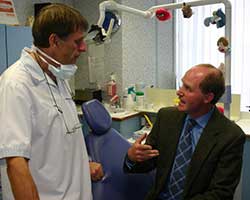|
The British National Health Service (2)
by David Wright
Primary care: The first point of contact most people have with the NHS is with their local family GPI or with dentists, pharmacists and opticians. This offers treatment of routine1 injuries and illnesses as well as preventive2 care, such as helping people stop smoking, encouraging them to take more exercise and eat more balanced and healthy diet. In the past, GPs were paid by the number of people registered with them, but now attempts are being made to reward practicesII for the quality of care given rather than the quantity of patients on their books. There are moves to treat patients more holistically3 – treating the whole person, rather than just the specific symptoms presented. GPs also provide health education and advice, give vaccinations and carry out simple surgical operations. The team may include nurses, health visitors4, midwives5, physiotherapists and occupational therapists6 and others. Around 300 million consultations a year take place in England. Every UK citizen has a right to be registered with a local GP and visits to the surgery are free. Unfortunately, people do not appreciate what they do not (directly) pay for and, every year, thousands of appointments7 are not kept wasting everybody’s time and denying someone else the opportunity to be seen. Moreover, thousands of prescriptions8 are wasted.
 Dentists mainly work in dental practices and provide check-ups9 and treatments such as fillings10, extractions11, fitting bridges12 and dentures13, scaling14 and polishing, as well advising people on how to look after their teeth and gums15 in order to prevent problems in the future. Dental practices can take private and NHS patients – with most practices taking a mixture of both III. For more specialised care such as surgery within the mouth, orthodontics (straightening teeth) and more complicated root canal and bridge work, you may be referred to a hospital dentist.
Dentists mainly work in dental practices and provide check-ups9 and treatments such as fillings10, extractions11, fitting bridges12 and dentures13, scaling14 and polishing, as well advising people on how to look after their teeth and gums15 in order to prevent problems in the future. Dental practices can take private and NHS patients – with most practices taking a mixture of both III. For more specialised care such as surgery within the mouth, orthodontics (straightening teeth) and more complicated root canal and bridge work, you may be referred to a hospital dentist.
Pharmacists (sometimes called chemists) supply prescription and ‘over-the-counter16’ medicines and give advice. They are experts in medicines and they play a key role in providing quality healthcare in the community and in hospitals. They can advise on a range of ailments17 such as minor injuries, skin conditions18 and allergies and help you decide whether you need to see a doctor. You can talk to your pharmacists in confidence and you don’t need to make an appointment. Many people prefer to visit a pharmacist informally in a local shop rather than making an appointment with their GP, not least because they get immediate advice and medicine if required, rather than having to wait a day or two until the doctor is available.
Opticians provide eye services to the general public and include:
- Ophthalmic medical practitioners are qualified doctors;
- Optometrists (ophthalmic opticians) are those you probably visit for sight tests and spectacles. They can diagnose abnormalities in the eyes and diseases such as glaucoma;
- Dispensing opticians who supply spectacles and contact lenses.
‘Walk-in Centres’ have been introduced recently, giving quick and easy access to health advice and treatment for minor illnesses and injuries. They are often situated near A&EIV and in convenient locations such as high streets and railway stations. They are run by experienced nurses and don’t require appointment. Most are open seven days a week, from early in the morning until late in the evening, and offer a variety of services, such as treatment for minor illnesses and for minor injuries. One of their busiest times is around midnight when drunks leave the pubs!
To be concluded...
I General Practitioners: the commonly used term for the doctor whom the patient generally sees first of all. It is the GP who will prescribe treatment and refer the patient to other specialists if necessary.
II The place where a doctor, dentist, etc, works is often called their ‘practice’. ‘Practice’ has two meanings: ‘to perform’; or ‘to keep doing something with the intent to do better’. It is the former meaning that is intended with reference to professionals.
III As I am writing this, I have just returned from a visit to my dentist. In some areas, it is difficult or impossible to find a dentist registered with the NHS – they all take only private (paying) patients.
IV Accident and emergency facilities.
1 routine – обычный
2 preventive – профилактический
3 holistically – глобально, целостно
4 health visitor – патронажная сестра
5 midwife – акушерка
6 occupational therapist – специалист по гигиене труда
7 appointment – время посещения врача
8 prescription – предписывание, рецепт
9 check-up – осмотр
10 filling – пломбирование зуба
11 extraction – удаление
12 bridge – мост (для искусственных зубов)
13 denture – зубной протез
14 scaling – удаление зубного камня
15 gum – десна
16 over-the-counter – продаваемый без рецепта
17 ailment – заболевание
18 condition – (зд.) заболевание
Читать еще в этой рубрике:
Читать еще в этом номере:
|
|











